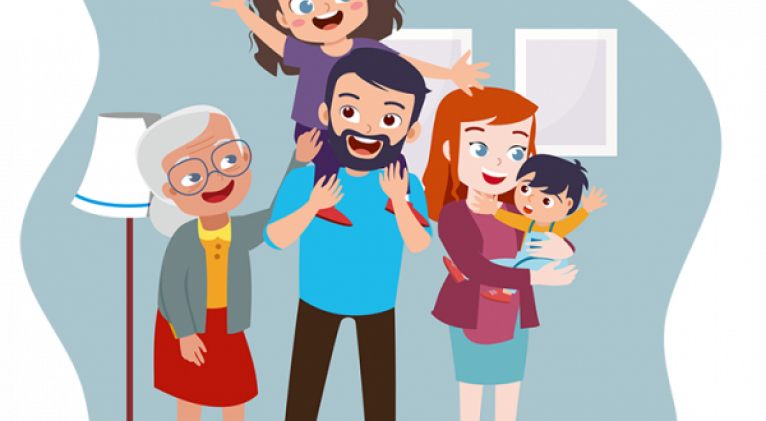Hugs to little champions
especiales

Professor Calviño pointed it out in his TV program Vale la Pena when praising how Cuban children have taken on this time of pandemic: they are champions.
No doubts, there are enough reasons to ratify the praise if we take into account that it has been difficult for adult to cope with isolation and everything that comes with it. So, we can figure it out how difficult things have been for children to whom school life, playing time, and the social exchange with other children are major needs and not stubbornness.
Nonetheless, they have mature when facing adversity. And even though little kids do not understand what is going on around them, they do sense that things are not all right, and danger looms around.
That is why, one year after the first COVID case was detected in the country, researches in Cuba have given paramount importance to the mental health status of Cuban boys and girls.
A study was conducted by professors at the Psychology School of the University of Havana with the collaboration of the UNICEF office in Cuba.
Its goal was to inquire on the psychological effects of the physical isolation in Cuban boys, girls and adolescents worsened by their isolation at home.
According to a recent statement made by UNICEF office in Cuba: “The first finding was that, although Cuban childhood is still resilient and showing no signs of severe psychological symptoms, the boys and girls on whom studies have been conducted on, showed signs of mild psychological distress.”
Such distress is not casual. In fact, some of the 139 million children who experienced compulsory confinement for at least nine months and other 193 million boys and girls who experienced recommended isolation worldwide were both affected by psychological distress.
In the experts’ opinion, little kids are especially sensitive to changes in their routines and living habits.
What were the results provided by the research carried out in Cuba?
The excessive attachment to mothers —60,6% of the total cases— was among the most common disorders. By the way, the quoted text states that “it is a very common reaction in childhood, as they seek for protection and safety when life conditions are considerably altered.”
Rebellious, challenging, and willed behaviors were also identified, especially in three years-old boys and adolescents older than twelve, “coinciding with two stages that are known for severe transitions in the individual’s growing process.”
Likewise, other symptoms of psychological distress were spotted:
Disturbed sleep schedule 60.2 %
Voluntarism 57 %
Rebellious and challenging behavior 43 %
Irritation and crying 41.8 %
Difficulty concentrating 27.5 %
Super-appetite 24.7 %
You may think these are just figures; but it is very complicated to live with one or two minors locked in at home and then you may experience that moment when your children do not want or just cannot sleep, or just confront you when they do not want to obey, or just want to eat something every two seconds.
The greatest challenges for Cuban families
The aforementioned research addresses six major issues Cuban families face with children in times of COVID-19.
Respect schedules and routines
Cope with the behavior of our children
Arrange the study schedule
Combine teleworking, housework, and childcare
Activities to entertain children and appropriate
What to do with the children’s will to play outside.
The answer to each of these questions will help to write a book, either a comedy book and other with hints of tragedy.
The issue of schedule and routines, for instance, would require a coordination of efforts at home as well as the conviction of the importance of maintaining that dynamic at home with time for resting, studying, entertaining, body washing, and feeding…
If these routines are interrupted, not only the mental health of the child might suffer, but also their physical condition.
Despite the adults’ efforts in several cases, near 70 % of children in the study remained reluctant to studying while 5.5 % of them cannot focus on school assignments.
Everything shows the challenge faced by mom, dad, and other family members when trying to get children focused on watching teleclases (video lessons on TV) and thus feel motivated to study at home, which is totally different from school and without the pedagogic resources to face such a mission.
If you add the need to systematically do the cleaning at home, guarantee food, and in some cases, do teleworking, then adults may also get stressed leading to misunderstandings and disagreements, which may be perceived by minors. All these may contribute to worsen their psychological status.
Hence, Cuban families have also done their best for the sake of children and made the most out of the available resources to keep harmony in the coexistence.
Some help has also come from outside our homes. The emergence of groups in social networks led by psychologist, educators, and other experts to provide psycho-emotional aid to parents has been very useful.
But, as stated again and again, children are the most important age group in Cuba. And UNICEF has corroborated so.
Therefore, Cuba is fighting hard to protect our little champions. From Dr. Durán’s calls to protect them to the daily work of health personnel, education personnel, and everyone involved in the socio-economic life of the nation.
And, despite the painful figures of children infected, the Cuban families have developed strategies with patience, wisdom, and especially, with responsibility and love. This way, our children shall remain our little champions.
Translated by Sergio A. Paneque Díaz / CubaSí Translation Staff














Add new comment